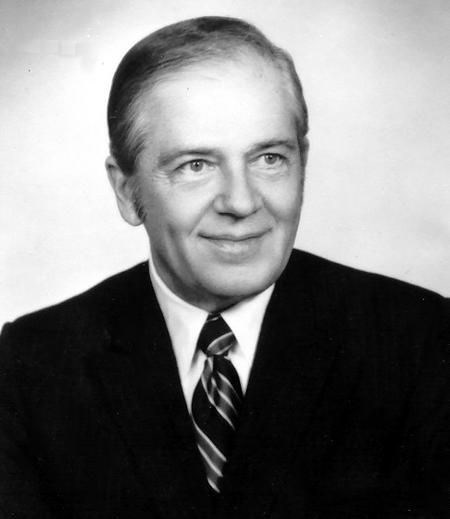
AVIS DE DÉCÈS
Charles F. Herring
1 juin 1914 – 15 janvier 2004

Charles F. Herring died in Austin on January 15, at age 89. He was born June 1, 1914, on a small farm in Stampede Valley, McClennan County, Texas. He worked for two years during the Depression raising cotton so that he could afford the $20/semester tuition to start at UT in Austin. He arrived at UT in 1933, with three home-made shirts and underwear made from flour sacks, and worked his way through school doing laundry for other students. He graduated from UT Law School in 1938. While in law school, he married Doris Marie Wallace of El Campo. She died in 1979. After law school, he went to work with Everett Looney, then one of the premier trial lawyers in Texas. Ed Clark later joined the firm. In 1941, Charles became County Attorney of Travis County, sharing offices and a secretary with the County Court at Law Judge Charles Betts. In 1942 Charles became General Counsel for the Office of Price Administration, a wartime agency. Then he moved to Washington to work for six months as an administrative assistant to Congressman Lyndon Johnson. Charles lived in Johnsons home, working seven days a week; at night he often joined Johnson in his regular meetings with Speaker Sam Rayburn and J. Edgar Hoover. In 1943 Charles enlisted in the Navy. Being from Stampede Valley and knowing almost nothing about ships or the Navy, when the enlistment officer offered him alternative commissions as either a lieutenant junior grade or an ensign (the lower rank), he mistakenly selected the lower rank as ensign. He served in the Pacific as a group commander of assault landing craft during several invasions, including Okinawa, Iwo Jima, Leyte Gulf, and Lingayen Gulf. In the Lingayen Gulf landing, a Japanese mortar hit squarely in the middle of his craft, destroying the boat and killing all thirty soldiers and crew, except for him. He was knocked into the water, unconscious, but was rescued by another ship. During the war, his mother became deathly ill. Lyndon Johnson learned of the illness, and orchestrated the sending of a secret message to him conveying the bad news. Charles asked for leave to return to see his mother, but his request was refused. He then went AWOL, hitch-hiking with sympathetic supply-plane crews across the Pacific. He arrived at the hospital in Waco and saw his mother for 30 minutes. Then she died. After a complicated return trip to the Pacific-including a stay on a nearly deserted island with a band of Australian Navy deserters who kindly fed and took care of him for a week-he returned to his ship and his captain reassigned him to duty, without discipline. By the end of the war, he achieved the rank of Lieutenant Commander, and received three Purple Hearts, a Navy Cross, and a Bronze Star. After the war, he returned to law practice with Looney & Clark, but in 1948 worked full-time on Lyndon Johnsons wild and successful U.S. Senate race. Charles ran the Austin headquarters for the campaign, in the old Hancock House at 8th and Lavaca. In 1948, he began practicing law with Herman Jones in the firm of Jones & Herring. In 1951 President Truman appointed Charles as U.S. Attorney for the Western District of Texas, and he served in that position until 1955. (At Johnsons suggestion, he remained in office even after Eisenhower became President in 1953-so that he was the last Democrat in the nation still serving as U.S. Attorney during that Administration, and as a consequence, received only one-half of the pay that all other U.S. Attorneys received.) After he returned to private practice, Charles established a law firm with Fred Werkenthin. In 1956, Charles was elected to the Texas Senate from the 14th Senatorial District. He hired Margaret Williams to manage his campaign, and she continued working as his most trusted assistant, and close friend, throughout his multiple career changes, for the next 47 years. During his first Session, he joined Senators Henry B. Gonzales and Hubert Hudson in a three-day filibuster against 11 anti-desegregation bills; the filibuster killed all but three of the bills. Charles served in the Senate for 17 years, and during his tenure chaired every major Senate committee, and sponsored a great deal of significant legislation, including adoption of the Uniform Commercial Code, creation of the Texas Water Commission and the Air Control Board, donation of state property for the creation of MoPac Boulevard, and overhaul of the Texas Penal Code. When Ben Ramsey resigned as Lieutenant Governor to take an appointment to the Railroad Commission, Charles, who was then President Pro Tempore of the Senate, became acting Lieutenant Governor. Charles left the Senate in 1973, and became General Manager of the Lower Colorado Authority. Eight years later he became CEO of First Federal Savings & Loan Association, from which he retired in 1987. He continued practicing law until 1993. He is survived by three daughters, Carol Herring Weir and husband, Warren, of San Antonio; Ann Herring McDonald and husband, Darryl, of Normangee; Toni Herring, of Austin; and one son, Charles F. (Chuck) Herring, Jr. and wife, Ginny Agnew, of Austin; eight grandchildren; thirteen great-grandchildren; and one great-great grandchild. Visitation hours will be from 5:00 to 7:00 p.m. on Sunday, January 18th at Weed-Corley-Fish Funeral Home, with recitation of the Holy Rosary following at 7:00 p.m. Funeral services will be held at 11:30 AM on Monday, January 19, 2004 in the chapel of Weed-Corley-Fish Funeral Home, followed by interment at Texas State Cemetery. Arrangements by Weed-Corley-Fish Funeral Home, 3125 N. Lamar Blvd., Austin, Texas 78705 (512) 452-8811. You may view memorials online at www.wcfish.com
Montrez votre soutien
Envoyez Vos
Condoléances
Partager
L'avis De Décès
Obtenir les mises à jour
Prestations de Service
Partager l'avis de décès
- Recevoir Des Avis
v.1.8.18